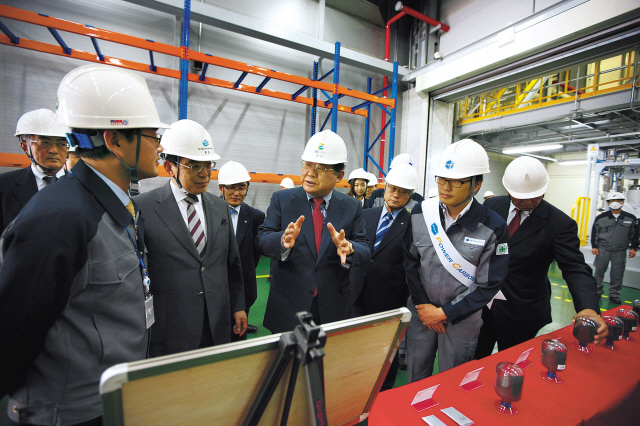Oil refiners seek transformation into energy companies for growth potential
“New growth engine” has been one of the most bandied about phrases in the local corporate world over the past few years.
With the global economic downturn being prolonged, companies have had no choice but to step up efforts to find new revenue sources within or beyond their core businesses.
The nation’s top two oil refiners have bet on the rechargeable battery market to find a stable revenue source as their core oil refining business remains vulnerable to volatile international oil prices.
SK Innovation, the nation’s top refiner, expanded its share in the rechargeable battery market for electric vehicles, or EVs, this year by completing an EV battery plant in Seosan, South Chungcheong Province, on Sept. 18.
The Seosan plant, in which SK Innovation invested 250 billion won ($230 million), has a battery production capacity to power 10,000 EVs a year. The completion of the plant means that the company has built a vertical production system, from electrode production to battery cell to battery pack assembly.
 |
GS Caltex chairman Hur Dong-soo (third from left, gesturing) explains the production process of negative electrodes, a key material in rechargeable battery packs, to his VIP guests at the company’s production site in Gumi, NorthGyeongsang Province, in May. (GS Caltex) |

GS Caltex, the nation’s second oil refiner, followed suit, establishing GS Energy early this year to focus on its new businesses, including the rechargeable battery business. The company focuses on producing negative electrodes, one of four key materials to make a rechargeable battery pack with a positive electrode, electrolyte and separator. The company produces negative electrode with its own technology.
Transformation to green energy firm
Behind the entry of the nation’s top two oil refiners into the battery business is the management’s effort to transform the companies into an energy company beyond the oil-related business.
“SK Innovation has shifted its gear to become a technology-based global energy company and the company looked to rechargeable batteries as they are a green energy source with high growth potential,” an official from SK Innovation said.
On SK Innovation’s 50th anniversary on Oct. 13, SK Group chairman Chey Tae-won reaffirmed the company’s new direction by setting the company’s sales target at 290 trillion won ($260 billion) by 2020. To achieve the goal, the company has invested in green energy technology in such areas as rechargeable batteries for EVs and green coal, while expanding its core businesses like oil refinery and overseas oil development as well.
GS Caltex unveiled a similar growth vision, redefining its corporate identity as an energy company. The company transferred energy-related businesses to newly established GS Energy early this year, which takes a 50 percent stake in GS Galtex.
Outlook for rechargeable battery market
The green battery market has two segments in general, depending on the size of battery. Small rechargeable batteries power small electric goods like phones and notebooks. Mid-size and big rechargeable batteries are required to power bigger products like EVs or energy storage systems. Korea leads both markets.
SDI, an affiliate of Samsung Group, was the leader worldwide with a 23.6 percent market share in the small battery segment last year along with the steep growth of Samsung Electronics, a key client of SDI. LG Chem, operating in both segments, is a global market leader, in particular, in rechargeable batteries for EVs.
Despite the global economic downturn, the outlook for the rechargeable battery market is still brisk. The Ministry of Knowledge Economy projected the rechargeable battery market to expand to 65 trillion won ($60 billion) by 2020, five times the 13 trillion won ($10 billion) seen in 2012 along with rising demand for mid-size and big green batteries.
Despite the high growth potential of the rechargeable battery market, market watchers take a wait-and-see stance toward entry of the nation’s top two refiners to the rechargeable due to worsening business condition in the world.
“They are late starters, but they are armed with competitive technology and continued investment. Their success depends on how fast the world economy will recover,” an analyst from KDB Daewoo Securities said.
LG Chem lowered it annual sales target for its battery business for EVs to 500 billion won in July from 800 billion won projected at the beginning of this year due to slower demand for EVs.
SK Innovation said it will push for investment in its rechargeable battery business for EVs. SK Innovation confirmed it is making the final touches to launch a joint venture with the German auto parts giant Continental within this year as planned. The company added it would double the production capacity of the Seosan plant by 2013.
By Seo Jee-yeon (
jyseo@heraldcorp.com)





![[Herald Interview] 'Trump will use tariffs as first line of defense for American manufacturing'](http://res.heraldm.com/phpwas/restmb_idxmake.php?idx=644&simg=/content/image/2024/11/26/20241126050017_0.jpg)


![[Health and care] Getting cancer young: Why cancer isn’t just an older person’s battle](http://res.heraldm.com/phpwas/restmb_idxmake.php?idx=644&simg=/content/image/2024/11/26/20241126050043_0.jpg)
